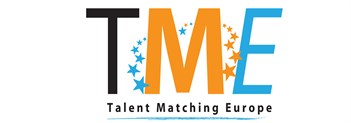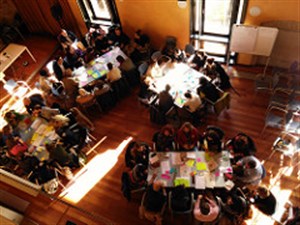 The historic Pati Llimona Civic Centre in the heart of Barcelona’s Gothic Quarter was the setting for an international creative industries workshop on the 3rd February, attended by 46 professionals experienced in working with young people.
The historic Pati Llimona Civic Centre in the heart of Barcelona’s Gothic Quarter was the setting for an international creative industries workshop on the 3rd February, attended by 46 professionals experienced in working with young people.
The aim of the event was to bring together professionals from different backgrounds (initial skills training, job orientation, the cultural sector) and facilitate the exchange of experiences of how to mentor young people towards a career in the cultural and creative sectors across the EU.
The event in Barcelona was the latest development in Talent Matching Europe (TME), a project to design, test and validate a new training and competency framework for Vocational Mentors across Europe using the arts and creative approaches to harness the potential of young people. Talent Matching Europe includes partners from 6 countries: Italy, Croatia, Spain, Poland, FYR Macedonia and the UK.
The day before the event, Trevor Burgess from Rinova had led the TME partner steering group meeting in Barcelona, which agreed the outcome of six months’ research and development to define an occupational profile and competence standards for this vocational mentor role.
The event at Pati Llimona gave an opportunity to test this newly defined framework against the experience of professionals working in the field. It opened with a round table including youth project leader Toby Fernandes, and youth mentors, Michael Merchan and
 At the core of the event was the opportunity to exchange experiences in group workshops. Discussion focused around how the work of a creative mentor is defined in different social and national contexts, and what a vocational mentor needs to know. The results of the workshops will feed into the next stage of Talent Matching Europe, which is to design and pilot learning modules and an online learning platform to support the professional development of vocational creative mentors. Otis Vickers-Graver from Collage Arts, who spoke about Talent Match, one of the models in the UK for creative mentoring with young people. Then, Anna Ochmann, of Arteria, Poland, spoke about developing the occupational profile and standards for the mentor role. Finally, Carme de Flor, Director of Barcelona’s Civic Centres, described some of the issues around access to the creative industries for young people in Barcelona. Pictured: A view from above – delegates take part in round tables at the Pati Llimona civic centre event on the 3rd February.
At the core of the event was the opportunity to exchange experiences in group workshops. Discussion focused around how the work of a creative mentor is defined in different social and national contexts, and what a vocational mentor needs to know. The results of the workshops will feed into the next stage of Talent Matching Europe, which is to design and pilot learning modules and an online learning platform to support the professional development of vocational creative mentors. Otis Vickers-Graver from Collage Arts, who spoke about Talent Match, one of the models in the UK for creative mentoring with young people. Then, Anna Ochmann, of Arteria, Poland, spoke about developing the occupational profile and standards for the mentor role. Finally, Carme de Flor, Director of Barcelona’s Civic Centres, described some of the issues around access to the creative industries for young people in Barcelona. Pictured: A view from above – delegates take part in round tables at the Pati Llimona civic centre event on the 3rd February.
To kick off the next stage of the project in April, Rinova and Collage Arts will be hosting a week-long ‘laboratory’ in London’s Wood Green Cultural Quarter for a small group of experts in this field drawn from the partnership. Building on the research undertaken so far, this group’s wide and varied experience of mentoring young people towards a creative career in different countries will shape the structure and outline content of the learning materials.



